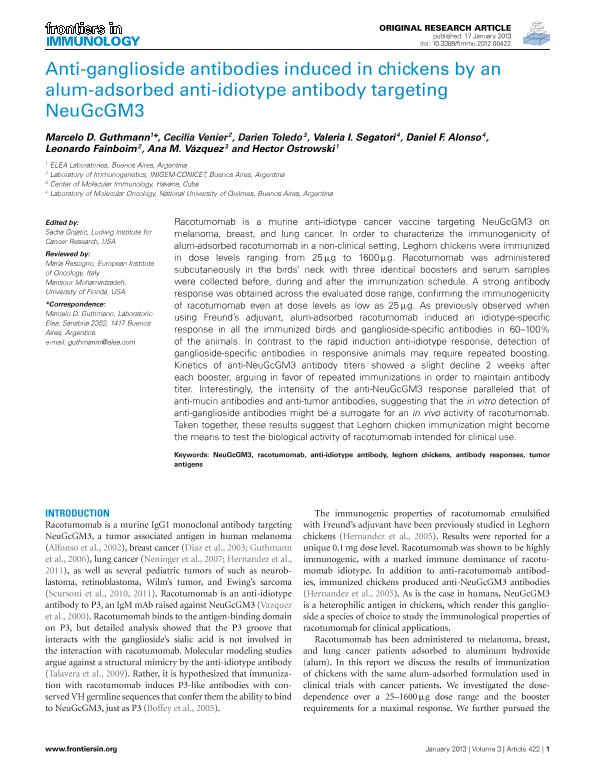Mostrar el registro sencillo del ítem
dc.contributor.author
Guthmann, Marcelo D.
dc.contributor.author
Venier, Cecilia

dc.contributor.author
Toledo, Darien
dc.contributor.author
Segatori, Valeria Inés

dc.contributor.author
Alonso, Daniel Fernando

dc.contributor.author
Fainboim, Leonardo

dc.contributor.author
Vazquez, Ana Maria

dc.contributor.author
Ostrowski, Héctor
dc.date.available
2017-06-29T15:51:10Z
dc.date.issued
2013-01
dc.identifier.citation
Guthmann, Marcelo D.; Venier, Cecilia; Toledo, Darien; Segatori, Valeria Inés; Alonso, Daniel Fernando; et al.; Anti-ganglioside antibodies induced in chickens by an alum-adsorbed anti-idiotype antibody targeting NeuGcGM3; Frontiers; Frontiers in Immunology; 10; 1-2013; 1-20; 422
dc.identifier.issn
1664-3224
dc.identifier.uri
http://hdl.handle.net/11336/19119
dc.description.abstract
Racotumomab is a murine anti-idiotype cancer vaccine targeting NeuGcGM3 on melanoma, breast, and lung cancer. In order to characterize the immunogenicity of alum-adsorbed racotumomab in a non-clinical setting, Leghorn chickens were immunized in dose levels ranging from 25 μg to 1600 μg. Racotumomab was administered subcutaneously in the birds' neck with three identical boosters and serum samples were collected before, during and after the immunization schedule. A strong antibody response was obtained across the evaluated dose range, confirming the immunogenicity of racotumomab even at dose levels as low as 25 μg. As previously observed when using Freund's adjuvant, alum-adsorbed racotumomab induced an idiotype-specific response in all the immunized birds and ganglioside-specific antibodies in 60–100% of the animals. In contrast to the rapid induction anti-idiotype response, detection of ganglioside-specific antibodies in responsive animals may require repeated boosting. Kinetics of anti-NeuGcGM3 antibody titers showed a slight decline 2 weeks after each booster, arguing in favor of repeated immunizations in order to maintain antibody titer. Interestingly, the intensity of the anti-NeuGcGM3 response paralleled that of anti-mucin antibodies and anti-tumor antibodies, suggesting that the in vitro detection of anti-ganglioside antibodies might be a surrogate for an in vivo activity of racotumomab. Taken together, these results suggest that Leghorn chicken immunization might become the means to test the biological activity of racotumomab intended for clinical use.
dc.format
application/pdf
dc.language.iso
eng
dc.publisher
Frontiers
dc.rights
info:eu-repo/semantics/openAccess
dc.rights.uri
https://creativecommons.org/licenses/by/2.5/ar/
dc.subject
Neugcgm3
dc.subject
Racotumomab
dc.subject
Anti-Idiotype Antibody
dc.subject
Leghorn Chickens
dc.subject
Antibody Responses
dc.subject
Tumor Antigens
dc.subject.classification
Inmunología

dc.subject.classification
Medicina Básica

dc.subject.classification
CIENCIAS MÉDICAS Y DE LA SALUD

dc.title
Anti-ganglioside antibodies induced in chickens by an alum-adsorbed anti-idiotype antibody targeting NeuGcGM3
dc.type
info:eu-repo/semantics/article
dc.type
info:ar-repo/semantics/artículo
dc.type
info:eu-repo/semantics/publishedVersion
dc.date.updated
2017-06-21T18:40:26Z
dc.journal.volume
10
dc.journal.pagination
1-20; 422
dc.journal.pais
Suiza

dc.journal.ciudad
Lausana
dc.description.fil
Fil: Guthmann, Marcelo D.. Laboratorios ELEA; Argentina
dc.description.fil
Fil: Venier, Cecilia. Consejo Nacional de Investigaciones Científicas y Técnicas. Oficina de Coordinación Administrativa Houssay. Instituto de Inmunología, Genética y Metabolismo. Universidad de Buenos Aires. Facultad de Medicina. Instituto de Inmunología, Genética y Metabolismo; Argentina
dc.description.fil
Fil: Toledo, Darien. Center of Molecular Immunology; Cuba
dc.description.fil
Fil: Segatori, Valeria Inés. Universidad Nacional de Quilmes. Departamento de Ciencia y Tecnología. Laboratorio de Oncología Molecular; Argentina. Consejo Nacional de Investigaciones Científicas y Técnicas; Argentina
dc.description.fil
Fil: Alonso, Daniel Fernando. Universidad Nacional de Quilmes. Departamento de Ciencia y Tecnología. Laboratorio de Oncología Molecular; Argentina. Consejo Nacional de Investigaciones Científicas y Técnicas; Argentina
dc.description.fil
Fil: Fainboim, Leonardo. Consejo Nacional de Investigaciones Científicas y Técnicas. Oficina de Coordinación Administrativa Houssay. Instituto de Inmunología, Genética y Metabolismo. Universidad de Buenos Aires. Facultad de Medicina. Instituto de Inmunología, Genética y Metabolismo; Argentina
dc.description.fil
Fil: Vazquez, Ana Maria. Center of Molecular Immunology; Cuba
dc.description.fil
Fil: Ostrowski, Héctor. Laboratorios ELEA; Argentina
dc.journal.title
Frontiers in Immunology
dc.relation.alternativeid
info:eu-repo/semantics/altIdentifier/url/http://journal.frontiersin.org/article/10.3389/fimmu.2012.00422/full
dc.relation.alternativeid
info:eu-repo/semantics/altIdentifier/doi/http://dx.doi.org/10.3389/fimmu.2012.00422
dc.relation.alternativeid
info:eu-repo/semantics/altIdentifier/url/https://www.ncbi.nlm.nih.gov/pmc/articles/PMC3547288/
Archivos asociados
